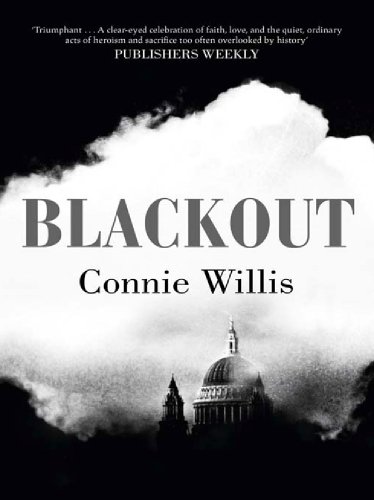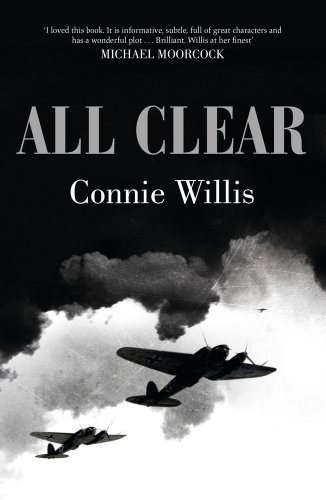‘Is it a comedy or a tragedy?’
He doesn’t mean the war, she thought. He’s talking about all of it – our lives and history and Shakespeare. And the continuum.
She smiled down at him. ‘A comedy, my lord.’ (All Clear, p. 734)
The premise: time-travelling historians visit London and the Home Counties in the dark days of 1940, and can't get home, because their pick-up points stop working. And nobody has come to fetch them. World War II is always a difficult assignment, because there are so many divergence points where historians just can't 'land': these, according to theory, are the points at which the presence of a time traveller could change history itself. So Polly, Eileen, and Michael are trapped in (mostly) London in the Blitz. For fourteen hundred pages.
I hadn't read this long, two-volumed novel before -- I have to be in the right mood for Connie Willis -- but it suited my appetite for cosy catastrophes, so I dived in. And it was a very enjoyable read.
Polly seeks work as a shop assistant, aiming to observe the people who shelter in tube stations: she joins an amateur dramatics group. Michael has gone to 1940 in the hope of seeing heroes in action: it's impossible to reach Dunkirk itself, but he hopes to spend a couple of days talking to the weekend sailors and retired captains who make the crossing. And Merope, known as Eileen for her sojourn in the 20th century, is observing child evacuees at a stately home in the countryside, and wondering darkly if the brattish Hodbin siblings are Hitler's secret weapon.
None of their assignments goes according to plan: and the ways in which circumstance conspires are intricately woven together. Each of them forms strong emotional (though not romantic or sexual) bonds to the 'contemps' they encounter; each is terrified at the destruction around them, and yet able to see the beauty in both firestorms and everyday bravery; each makes a lot of poorly-informed assumptions and decisions, risks death, and changes lives.
I think I was put off, when Blackout was first published, by several reviews pointing out basic errors: the Jubilee line didn't exist in 1940; you don't make a phone call from a pillar box; a phone call wouldn't cost '5p' ... I am happy to say that most, though not all, of those errors had been corrected by the time the Kindle edition was produced.
I do have some gripes, though. The characters (and not just the time travelling ones) seem incapable of getting around London except by public transport. There's a scene where they're on a train somewhere in the vicinity of Tower Hill and need to get to St Pauls, so they go to Monument and change to the Central line ... but the Central line isn't working, so they spend ages getting to, I think, Blackfriars. Instead of walking from Bank, which'd take about ten minutes.
Much of the novel's plot pivots on miscommunication, bad decisions, poor logistics, missed meetings ... I found this terribly frustrating and not a little repetitive. Worst were the scenes in 2060s Oxford, where apparently the mobile phone, email, pagers etc have been uninvented.
And, perhaps most damning of all, two of the characters appear twice, using different identities: and I couldn't tell. There was simply nothing to unify identity A and identity B.
All those gripes aside, I really did enjoy immersing myself in Willis' Blitz for a few days. There is a cosiness, and a very humane and compassionate sense of community, underlying this story. Love and beauty and art matter; sacrifices count for a great deal; tiny changes have immense effects: carry on, and don't despair.


Only the most egregious errors were removed by early readers; plenty more errors crept through and they maddened me. oddly, if the "Jubilee Line" had been left in, it would have turned the novel into an alternate universe story as it would imply the renaming of part of the Tube to mark George V's Silver Jubilee in 1935...
ReplyDelete